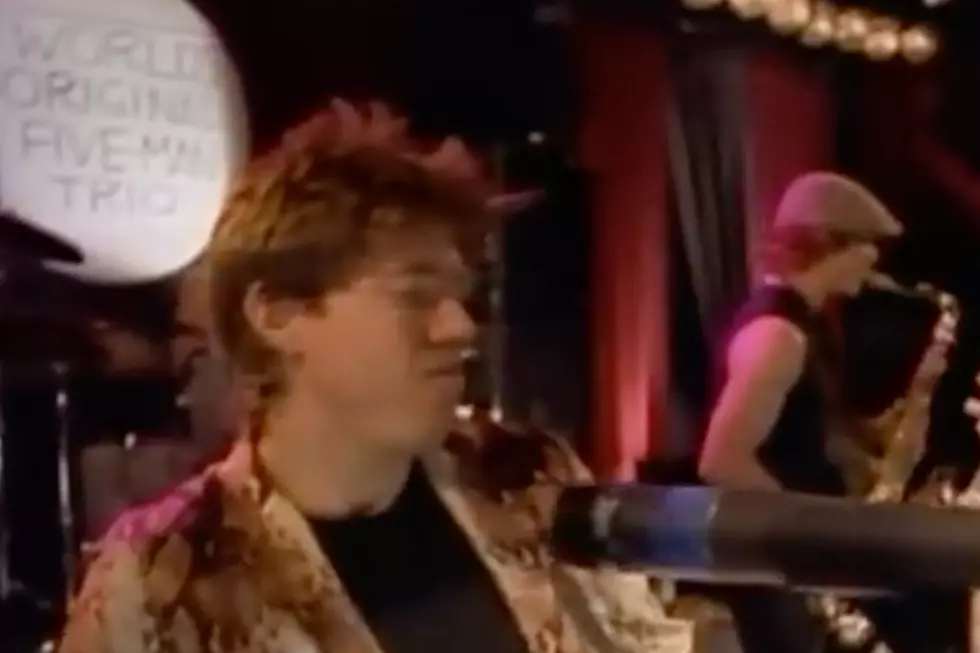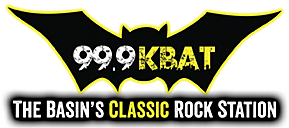
The Story Behind George Thorogood’s Slow-Developing ‘Bad to the Bone’
The first original song that George Thorogood ever wrote was "Bad to the Bone." Celebrating its 40th anniversary this year, the track is still omnipresent on classic rock radio and has been used in countless movies and television shows. Not a bad place to begin your career as a songwriter.
Thorogood and his band have put their spin on plenty of blues staples over the years, notably making radio classics out of John Lee Hooker's "One Bourbon, One Scotch, One Beer," "Move It On Over" by Hank Williams and Bo Diddley's "Who Do You Love."
But Thorogood felt pigeonholed as someone who only did covers, despite having a large catalog of originals. "A lot of people think that’s entirely what defines George Thorogood," he tells UCR. "Now, we checked out our albums and there are lots and lots of original songs. I just got tired of doing that in interviews, trying to set people straight."
Seeds were planted for The Original George Thorogood, which arrives on April 15. The collection brings together 14 of his favorite self-penned songs, including a stack of hits, but also plenty of deeper cuts.
George Thorogood and the Destroyers also have a year full of tour dates that will carry them overseas and back again. In June, they link up with Sammy Hagar for a summer run. Thorogood joined us recently to discuss how some of the songs featured in The Original George Thorogood came together.
What do you remember about the first song you ever wrote?
I was working on a tune. We were doing this thing called the 50/50 Tour. During that tour, I was working on a song. We had a show to do in New Orleans with the Rolling Stones and the Neville Brothers. Before I went on stage, a gentleman came up to speak with me. He was a very nice man. He was kind of a chatterbox and a little bit shorter than me. He said, “George, I heard you’re writing songs now,” which I wasn’t doing before. I said, “That’s correct.” He said, “Well, if they’re anything like ‘[Bad to the] Bone,’ you’ll do alright.” Then he said, “Oh, by the way, I’m David Geffen.” I said, “Well, how did you know I was doing that?” – because I was only doing it in soundchecks. I never did it live. He said, “George, it’s my job to know things like that.” So that was the first one. I thought, “Well, you’re off to the races. There, you’ve got David Geffen’s endorsement.” So we said, “Well, maybe we should put that on the next record!”
How did the song itself come together?
I was doing some shows with the Rolling Stones and the J. Geils Band. As soon as Keith Richards hit the opening licks to “Honky Tonk Women” or “Start Me Up,” there would be a tremendous response. When J. Geils played, the intro to “Love Stinks,” it had such a great response. I thought, “Well, Georgie boy, you’d better write something that has that reaction, or 15 years from now, they’re going to be saying, whatever happened to that Thorogood guy? Wasn’t he good at doing Chuck Berry or something?” So I said, “Well, you’d better come up with something here to hang your hat on. Those two acts were very inspirational in saying that sometimes it doesn’t even have to be something you wrote, but it helps.
How long did it take to write?
A few months.
It took a while then. What was the struggle to get it done?
Well, you’ve got to understand something. When I was putting together that song, which was 1981-1982, rock had been around for 30 years. I mean, look at some of the great rock songs that had come out between that time. “Rock'n Me” [by Steve Miller Band] or “Jumpin’ Jack Flash’” or [Led Zeppelin's] “Stairway to Heaven.” I could go on and on and on. You know, [Jimi Hendrix's] “Purple Haze,” and all of that. The tremendous catalog of rock at that point was monstrous. It was huge. So, I was really struggling there. I wanted it to be kind of a bluesy Bo Diddley thing, something like that. You come up with a title and you say, “Oh, no, the Jefferson Airplane already did that.” Okay, how about this title? “Ah, the Kinks already did that.” Everybody already did everything! Everything had been done at that point. So that was the struggle to find something that would stand out. I just found out recently that Rock & Roll Hall of Famer Joan Jett came up with a song in 1980 called “Bad Reputation.” Now, I’m certainly glad I found that out after “Bad to the Bone” came out. If I had known Joan had done that song, I never would have done “Bad to the Bone.” I would have said, “It’s been done!” You know, “Bad Reputation,” “Bad to the Bone,” boom, boom, boom, it’s all the same. So what I did was something that [musically] says, “Well, it’s got a familiar ring to it.” It’s kind of been done. I thought it would have been a great song for Bo Diddley. I thought it would have been right up his alley. I actually wanted him to do it, but he didn’t have a record label at the time, unfortunately.
Watch George Thorogood and the Destroyer's 'Bad to the Bone' Video
Would you test songs out live back in the day? Because "Gear Jammer" is a barn burner. How quickly did it develop into that kind of song?
It was something that was like lightning in a bottle. Boom. I always say the best songs are the ones that happened fast. We were jamming on it and I said, “Man, if we can come up with some lyrics for this and a title, we might have something.” Now, during that time, I started noticing as we were traveling at night, we’d stop into truck stops and I noticed the world had changed. People who were truck drivers, if it was the ‘50s or 60s, the early ‘70s, 99 percent of the people who drove trucks were listening to country music. Then, I started noticing that rock started to filter in at the truck stops because it was a whole new younger generation of people who were truckers. I heard the word “gear jammer” in a Johnny Cash song and it said that was a nickname for a truck driver. So I said, “Well, if the new generation of truck drivers are turning to rock, maybe we might have something here.”
The intro of "I Drink Alone" has those signature dramatic pauses. Where did that come from?
You know, Richard Dreyfuss, the great character actor and Academy Award winner, he once said, “I steal from everybody.” He said, “If I can’t think of something to do, I’ll think, how did Jimmy Stewart do this?” He would get around it in that way. My good friend Joe Bonamassa, I said, “You know, Joe, your sound is great. It sounds familiar. You’re not copying anybody, but there’s a familiarity there to your music.” Joe said, “George, I am an equal opportunity thief. I steal from everyone.” The intro is totally J. Geils, who I am very influenced by. That’s kind of a signature J. Geils intro. At least that’s what I thought anyway, at the time.
Watch George Thorogood and the Destroyer's 'I Drink Alone' Video
"Miss LuAnn" is one of the deeper cuts on this collection and has a great guitar hook.
I did what everybody else does. I stole it from Keith Richards.
I'm seeing a pattern of theft developing here.
[Laughs.] Well, listen. You know, it’s like a tip of the hat. We had been touring with the Stones a lot. We were doing a lot of shows. I went out and watched them every night and watched Keith Richards play. All of the sudden, that riff just emerged. You know, the great Jimi Hendrix, he would go see somebody play. The next day, he would be imitating that. He was like a sponge. He picked up all of these things. Well, if you go see the Rolling Stones night after night after night after night, eventually some of it is going to sink in. That guitar part, it kind of blended subconsciously. It wasn’t like I said, “Oh, I’ve got to do that.” It just came out. We were fooling around with it and I said, 'Miss LuAnn,' with this riff. How come this song isn’t on the album Between the Buttons?'"
What's the best phone call you ever received because of your music?
All of them. Actually, I got a call from Frank Zappa.
No kidding!
No kidding. I talked with a gentleman who interviewed me in the Carolinas. I expressed how much of a fan I was of Frank Zappa. He said, “Well, I know Frank. I’ve done interviews with him.” I said, “Oh, that’s wonderful.” He said, “Now if I could hook it up for you two to talk, would you be interested?” I said, “Of course, I would.” A couple of years went by. The phone rings and I pick it up and I go, “Hello?” “George, this is Frank.” I knew it wasn’t Frank Sinatra. [Laughs.] You could tell by the voice. I don’t think you could do much better than that.
Had you recorded "Trouble Everyday," or did that come later?
No, we didn’t. When Frank passed, unfortunately, that was the only reason we did it – for a tribute to him. We did a miserable job of it. [Laughs.] I just should have hired the Mothers of Invention to back me up doing it. But what the hell, we gave it a shot. It was just an homage to Frank Zappa.
Listen to George Thorogood's 'Trouble Everyday'
George Thorogood and the Mothers of Invention would have been an entirely different outcome.
Well, you know, so what? So what if it is? You know, look at some of the off-the-wall people that Woody Allen puts in his movies. Never in a million years would you guess they’d put that person in the movie. Or Quentin Tarantino, he comes up with these people and you go, “Wow, that’s a cool idea.” Hey, I’m holding out, if Dweezil [Zappa] still wants to jam with me, I’m very available. How’s that?
What's your favorite Zappa album?
Freak Out! It was just so unique. It was his first record and it was just on the verge of the music world [and] the world in general, freaking out in society and in music. It came out just about the same time “Strawberry Fields Forever” came out by the Beatles. You could see a monster change coming. Frank Zappa’s thing was that he was almost proud of the fact that they might be outcasts. It says in the liner notes, “We could clean you guys up a little bit and make you as big as the Turtles.” At first, we thought he was trying to be freakish and unique and all of that, just to get people’s attention. Then, as I listened to him through the years, he wasn’t. This is what Frank does. He’s an abstract artist. He wasn’t the Monkees, let’s put it that way. That appealed to me. Plus, the music was just fantastic. A lot of the dry humor in it really appealed to me. I liked funny [stuff]. Offbeat comedy, Lenny Bruce and Ernie Kovacs, people like that. Frank is a very funny guy. When I did get the chance to see him play live, he and Peter Kaplan had a great rapport with the audience. They had really great humor. I saw Frank many times and this one time, he said, “We’re going to do a song now called ‘King Kong.’ It’s a story about some Americans who go to an island and capture a monster gorilla. The Americans take the gorilla back to America. The Americans make a lot of money off the gorilla and then they kill the gorilla.” [Laughs.] Who comes up with something like that? I mean, c’mon! He’s some kind of guitar player. You listen to the album Joe’s Garage and listen to some of that guitar playing.
I loved reading that in high school you were once unanimously voted least likely to succeed. Have you ever gone back to any of your class reunions?
Nah, they wouldn’t want to see me. You know, I’d probably go back and see ’em and say, “Hey, look what I’ve done.” They’d probably say, “Yeah, you’re still a bum.” Once a bum, always a bum!
Top 40 Blues Rock Albums
More From The Basin's Classic Rock










